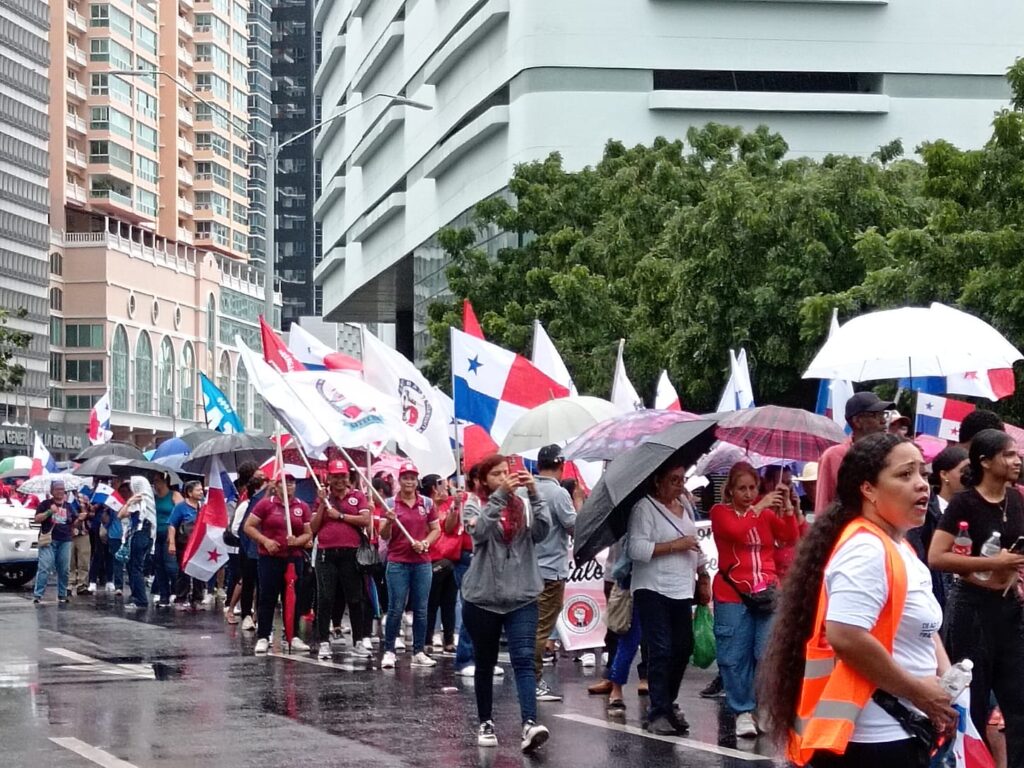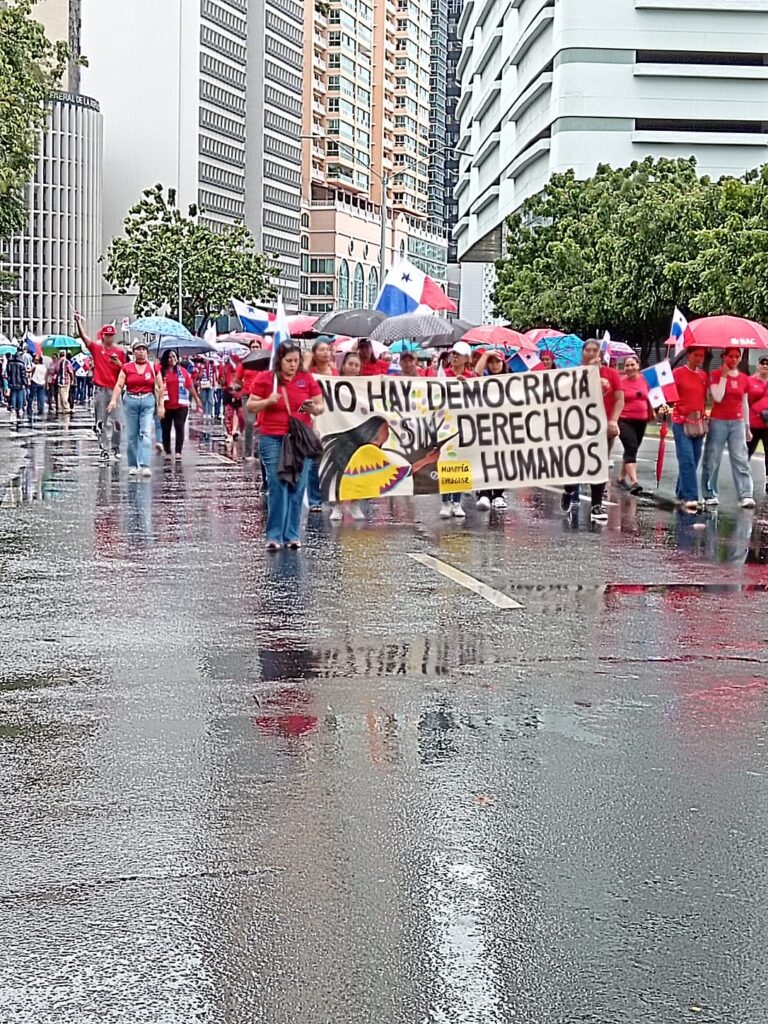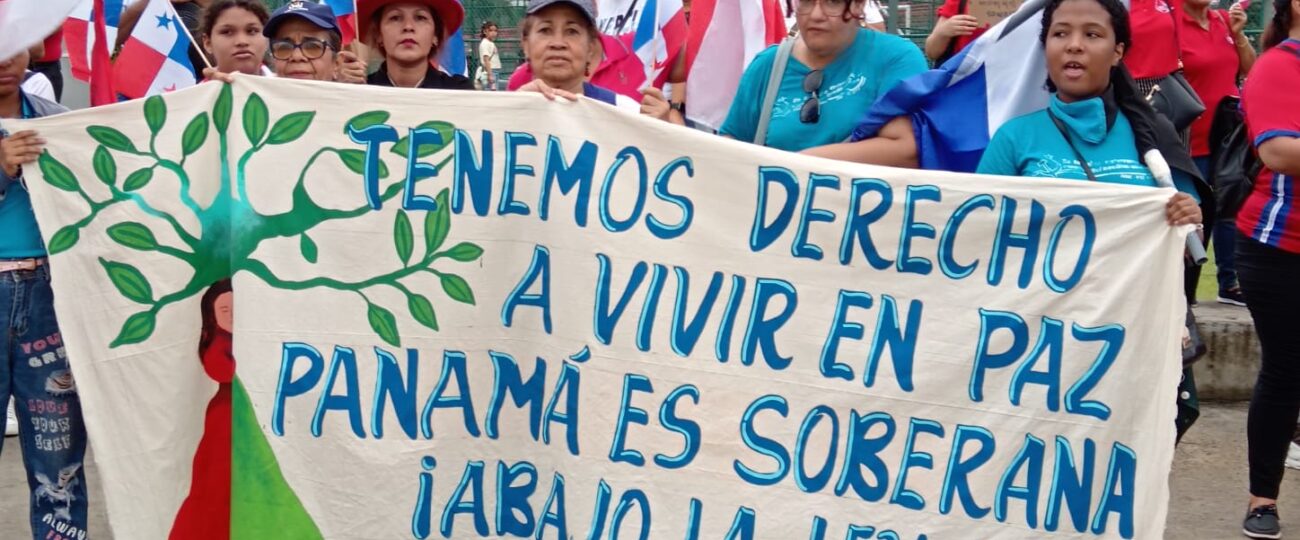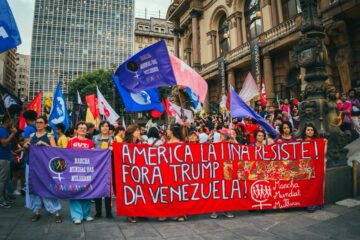Panama continues to be a center of intense conflicts and grassroots mobilizations for sovereignty. The country’s social movements and international allies denounce the political imprisonment, the seizure of rights, and the expansion of US imperialism in the country and the media blockade that keeps the narratives about the events under the control of international media. Since these mobilizations started, the government and the armed forces have clamped down on Indigenous peoples, women, and union activists. In a recent appeal, the Trade Union Confederation of the Americas (TUCA-CSA) has called global trade unions to support the Panamanian struggle and denounce the imprisonment of leaders including Genaro López and Jaime Caballero and the persecution of Erasmo Cerrud and Saúl Méndez, the latter now exiled in Bolivia.
These recent mobilizations demand the resignation of the incumbent president and his policies of militarization and increasing extractivism. They also reject the Trump administration’s policy that continues to seize the country’s resources. Isabel Guzmán, in her article available below, explains the recent events and addresses women’s participation and demands in this struggle.


The strike in Panama began on April 23rd, 2025, due to a number of situations that arose from the pension reform being pushed in the country. The government of José Raúl Mulino has intimidated and threatened the Panamanian people.
The process of negotiations around the reform
In an early process, two panels were set up at the presidential office. The first one was a space for listening about the pension reform, where the Disability, Old Age, and Death (IVM) program, one that most affects the population, was discussed. The other was a panel regarding health care benefits. It was a process of listening without endorsing the different proposals that the unions had.
A consultation was then supposedly held with the unions and the population at the National Assembly, when Bill 462 was presented, proposing changes to the pension system. The unions were listened to, but the demands we raised were not considered. Then the law was effectively implemented, hurting the working class’s pension system. We see the government’s intention to also sponsor the interests of businessmen so that pension funds are handed over to private hands. Not only that, a memorandum of understanding emerged between Panama, signed by the government, and the United States, jeopardizing the country’s sovereignty.
The strike
The strike began with teachers who took to the streets to defend the pension system and call for the repeal of Law 462. Then on April 28th, workers in the banana industry, which is quite significant in the country, and in the construction industry joined the strike. A number of unions and the community at large in all the provinces across the country are joining the movement.
Demonstrations are also rising to protest the sale of the homeland, in defense of sovereignty.
Another reason for the strike is the government’s intention to resume a mining project and impose the construction of dams on Indio River to store water for the Panama Canal. This is being called a multipurpose project, as there is a number of purposes for this dam — including persecuting grassroots, social, and union movements and attacking union freedom and, obviously, democracy.
The strike has been greatly supported by the people across the country, and the government has responded to it with an incumbent of questionable legitimacy escalating repression to unprecedented levels. What we see right now in our country is, once again, a dictatorship. The repression injured dozens and arrested more than a hundred people, and people have disappeared. There is a campaign to discredit and vilify social fighters and persecute the strongest organization in the country, the National Union of Workers in Construction and Similar Industries [Sindicato Único Nacional de Trabajadores de la Industria de la Construcción y Similares — SUNTRACS]. Leaders of this organization are under arrest and comrade Saúl Méndez, whose life is under threat, is currently in asylum in the Bolivian embassy.
We see a government that despises ideological political dissent and the fact that we raise our voices for human rights, labor rights and labor victories, national laws, and conventions on freedom of association.
Women in the struggle
We as women have actively participated in this process from the listening panels. We presented proposals for the care system that must be considered in the pension system, and for low-wage women workers. We consider it necessary to review the country’s wage system so that women can have a more dignified retirement.
We as women are the ones who bear the burden and support, with the care work we carry out, the lack of social and labor conditions and welfare policies that neither the state nor companies offer. We are facing a significant setback with the privatization of pension funds, which dooms us to poverty pensions. While they say that the retirement age will not be increased, the reform is detrimental to women and especially to the youth. And this goes to show the hatred the state feels towards the working class.
The panel on the Disability, Old Age, and Death (IVM) program was attended by participants from the United People’s Alliance for Life [Alianza Pueblo Unido por la Vida] and specifically from the Working Women’s Network [Red de Mujeres Trabajadoras]. We made a case for why women do not accept raising the retirement age. While Law 462 allegedly will not increase the retirement age, this is already actually happening, because the individual system will not allow women workers and youth to have access to decent retirement. Without a decent pension, women will be forced to continue to work beyond the retirement age.
We women have been waging the struggle, in the assembly and in the streets, where we have been met with repression. We have seen how Indigenous and peasant women and girls have been abused. They have been beaten and injured. Teachers have also been viciously assaulted by the national police.
We see an escalation of violence against women by the national government and the national police.
We also demand the dismissal of the Ministers of Education and Labor, who should ensure that policies are aimed at ending the precarious conditions women endure in the labor market, as well as tackling gender wage gaps and the brutal violence perpetrated against women. We demand compliance with Convention 190 on violence and harassment in the world of work, which has been ratified by Panama and which is also currently being violated.
Internationalist feminist solidarity
So far we have not seen any progress. The government of Panama has not accepted any of our demands. The people at large are out on the streets, yet the government is unable to create bridges for a dialogue. We have held press conferences from the working women’s unions and beyond. We have taken to the streets on Sunday, May 25th, in a great women’s march demanding that the government listen to the people.


Isabel Guzmán is a member of the Trade Union Confederation of the Americas (TUCA).




